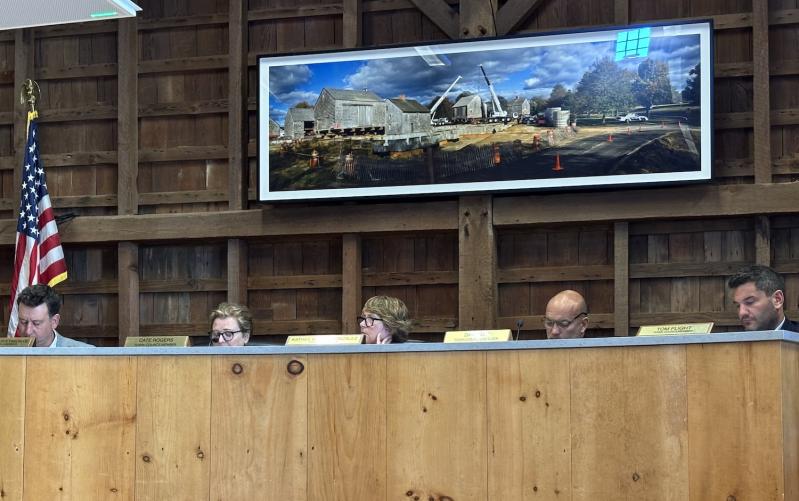The East Hampton Town Board was cautiously supportive of placing further restrictions on short-term rentals after a presentation by Councilwoman Cate Rogers on Tuesday.
Commercialization in residential districts is specifically forbidden in town code.
“We are looking at commercial investments in our residential districts by investors who only seek to make profit and are not looking at being part of this community at all,” Ms. Rogers said. “The issue at hand is the commercialization of residential properties or neighborhoods, creating businesses in residential neighborhoods.”
She provided voluminous amounts of data to support her assertion that this is no longer the rental market depicted in a 1950s-era John Cheever short story.
According to her data, gleaned by the short-term rental industry website AirDNA, there are currently over 1,800 such rentals available in the town and the average cost per night is over $1,200. The average length of stay at a short-term rental in East Hampton is only four nights.
Instead of introducing legislation, she framed the discussion as a solicitation of input from the board and community.
While the entire board agreed that abusers of the town’s rental codes should be stopped, how to separate full-scale business ventures from residents who have traditionally rented their houses became the main question.
“We don’t want to be treating East Hampton as a commodity, we need to be treating East Hampton as a community,” said Councilman David Lys, borrowing a line from Town Supervisor Kathee Burke-Gonzalez’s State of the Town speech.
“If you’re saying that the analytics are coming back that there are many large L.L.C. investors that are treating it like a commodity, I would look forward to finding other ways that we can continue to treat it like a community,” he said. “My family, for 50 years, has rented our houses. So, we have to make sure that doesn’t affect that traditional form of revenue.”
Councilwoman Rogers made clear, however, that she is specifically targeting the short-term rental market, and traditional rentals don’t fall into that category.
She defined a short-term rental as, “a single-family residence which is occupied by tenants for not more than two weeks on three or more occasions during any six-month period.”
In other words, the family that rents its principal residence for a month or entire season would not be affected.
Since 2015, when the East Hampton Town Board first passed its rental registry law, a lot has changed. While 12,179 rentals have been registered with the Building Department for a $200 fee, the amount registering per year is flat, despite massive growth in the industry, a potential red flag.
There are multiple online platforms where people can find rentals, a whole industry of management companies, short-term-rental-specific lenders, articles written about people quitting their day jobs just to purchase and flip houses in the Hamptons, and hospitality industry metrics and vocabulary being used to describe what were once residential houses.
Still, board members agreed that before they could provide solutions to the problem, they needed better data. To get that, Ms. Rogers suggested looking into software that was recently purchased by the Town of Southold that monitors third-party rental platforms and helps spot compliance issues.
“You can’t know what you need to do until you know what’s happening out there,” she said. “So, I think this is a critical step.” Apart from matching parcels to owners and cross-checking with registry and tax complaints, the software could even block listings that are over a town-imposed cap.
She mentioned that while the software wasn’t put in the preliminary budget, discussed earlier in the meeting, it wasn’t too late to add it.Other restrictions the town could contemplate would be: requiring that a short-term rental property be the owner’s primary residence, increasing fees, imposing its own transient occupancy tax, and forcing owners to show proof of compliance with Suffolk County tax requirements.
In 2023, Suffolk County created an occupancy tax that applied to people in short-term rentals, even those in private houses, not just in hotels or motels. Starting in June this year, John M. Kennedy Jr., the Suffolk County comptroller, successfully persuaded Airbnb to voluntarily collect the tax, instead of leaving it to platform users.
“It’s estimated that short-term rentals generate over $100 million in revenue for local homeowners,” said Councilman Tom Flight. “I think we have to be very cognizant of that as we move forward with this and continue to support the tourism industry out here. That said, I do think this is changing the nature, potentially, of the town we live in. The more this becomes commercialized by larger outside entities versus being operated by local people or local businesses, I think the less control we have.”
Indeed, Ms. Rogers said that besides the short-term behemoths Airbnb and Vrbo, even corporations like Marriott were starting to invest in the short-term-rental space.
“I think we can do a better job of ensuring that a rental is an allowable supplemental use of a residential property in a neighborhood outside of a commercial district, versus a strictly commercial venture,” she said.
The board agreed to further discussion before taking the next step, purchasing the software that would help flag flouters.




